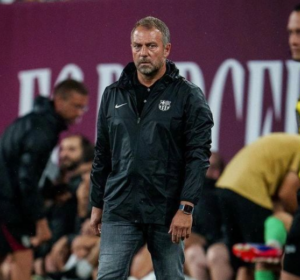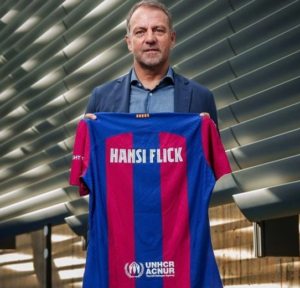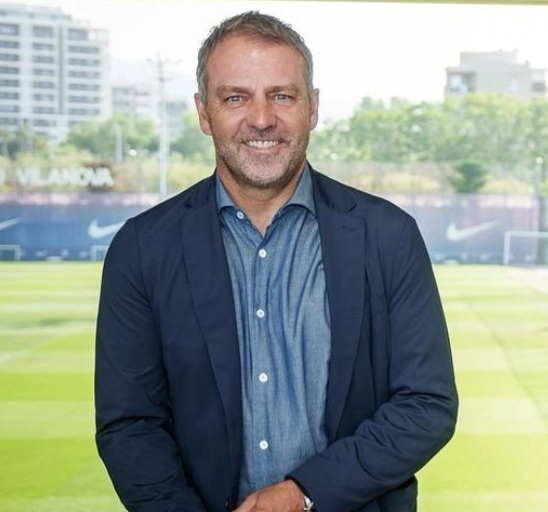Hans-Dieter “Hansi” Flick: A Journey from Player to Managerial Maestro
Hans-Dieter “Hansi” Flick, born on February 24, 1965, in Heidelberg, Germany, has carved out a remarkable career in football, both as a player and as a manager.1
Known for his tactical acumen and calm demeanor, Flick’s journey from the pitches of Germany to the dugouts of some of Europe’s most prestigious clubs is a testament to his footballing intellect and leadership qualities. As of now, Flick stands as the manager of La Liga giants FC Barcelona, continuing to build on his legacy in the football world.
Table of Contents
Early Life and Playing Career
Hansi Flick’s football journey began in his hometown of Heidelberg, where he played youth football before making his professional debut. Flick’s early career saw him join SV Sandhausen, a club in the lower tiers of German football.
His performances there caught the attention of Bayern Munich, one of Germany’s premier football clubs. In 1985, Flick made the significant move to Bayern Munich, a decision that would shape the trajectory of his career.
Transition to Management: Victoria Bammental
Flick’s passion for football did not wane after his playing days were cut short. Instead, he transitioned into management, beginning at the grassroots level.
His first managerial role came at Victoria Bammental, a fourth-division club in Germany, where he served as a player-manager. This role allowed Flick to develop his coaching philosophy and gain valuable experience in managing a team.
The Leap to Professional Management: Hoffenheim and Assistant Roles
After honing his skills at Victoria Bammental, Flick made the step up to professional football management with 1899 Hoffenheim in 2000. At Hoffenheim, he managed to stabilize the team in the third division of German football.2
However, his time at Hoffenheim was a learning curve, as he faced the challenges of managing a club with higher expectations and resources. Although his tenure at Hoffenheim ended in 2005 without major successes, it provided him with the experience necessary to understand the demands of professional football management.
Also Read: Hansi Flick Bio, Age, Career, Net Worth, Personal Life And More
Midfield Maestro: A Career with Bayern Munich
The midfielder’s journey in football began with a promising start, showcasing immense talent and potential. By the mid-1980s, his skills had caught the attention of Bayern Munich, one of Germany’s most prestigious clubs.3
View this post on Instagram
Joining Bayern in 1985 marked a significant step in his career, setting the stage for a period of remarkable achievements and contributions.
Making an Impact: Bundesliga Success
- During his tenure at Bayern Munich from 1985 to 1990, the midfielder became an integral part of the team. Over 104 matches, he demonstrated his versatility and effectiveness in the midfield, contributing both defensively and offensively.
- His presence in the squad was a key factor in Bayern Munich’s domestic success during these years.

- The midfielder played a crucial role in Bayern Munich’s dominance in the Bundesliga. The club secured four Bundesliga titles during his time, reflecting their consistent performance and the midfielder’s vital contributions to their success.
- His ability to control the midfield, distribute the ball effectively, and support both attack and defense was instrumental in Bayern’s domestic triumphs.
DFB-Pokal Triumph
In addition to their Bundesliga victories, Bayern Munich also achieved success in the DFB-Pokal, the premier German cup competition.
The midfielder was part of the squad that clinched the DFB-Pokal title, further cementing his role in the team’s achievements. The cup win was a testament to the team’s depth and the midfielder’s contributions to their successful campaign.
European Stage: The 1987 European Cup Final
- The pinnacle of his career with Bayern Munich came with a notable appearance on the European stage. The midfielder played in the 1987 European Cup Final, showcasing his abilities on a grand stage.
- Although Bayern Munich did not win the title, reaching the final was a significant accomplishment and highlighted the team’s competitiveness in European football.
- The midfielder’s career with Bayern Munich left a lasting impact on the club. His performances in 104 matches, his role in securing four Bundesliga titles, and his participation in the 1987 European Cup Final are a testament to his quality and influence.
- His contributions helped shape a successful era for Bayern Munich, solidifying his place in the club’s history.
Hansi Flick’s Barcelona Era: A New Chapter
On 29 May 2024, Barcelona made a significant move by appointing Hansi Flick as their new head coach. Flick, who had previously achieved considerable success with Bayern Munich, signed a contract with the La Liga giants that would keep him at the club until 30 June 2026.
This appointment marked a new era for Barcelona, as Flick became the third German to take on the head coaching role in the club’s history, following Hennes Weisweiler and Udo Lattek.

Early Success: Debut Victory Against Valencia
Hansi Flick’s first competitive match as Barcelona’s head coach took place on 17 August 2024, against Valencia at the Mestalla. In a dramatic and closely contested encounter, Flick’s Barcelona secured a 1–2 comeback victory.
This win was not only a strong start to his tenure but also notable for ending Barcelona’s frustrating streak of 0–0 draws on matchday 1 that had lasted for two years.
In den bisherigen Blick von Bayern München gegen Dortmund auf das 4 : 2 (🔴 vs 🟡)
Into the previous look of Bayern Munich against Dortmund on the score of 4-2. pic.twitter.com/fA8wCdmbrX
— Hans-Dieter Flick (@HansFlickTeam) March 8, 2021
Strategic Changes and Tactical Approach
Flick’s arrival at Barcelona brought with it a fresh tactical approach. Known for his high-intensity pressing and fluid attacking style at Bayern Munich, Flick sought to implement similar strategies at Barcelona.

His focus on dynamic movement, quick transitions, and an aggressive pressing game aimed to rejuvenate the team’s playing style and return Barcelona to the top of Spanish and European football.
Challenges and Adaptations
- As with any major coaching change, Flick faced challenges in his initial months at Barcelona. Integrating his tactical philosophy with the existing squad and navigating the demands of La Liga and European competitions required careful planning and adaptation.
- Flick’s ability to manage player relationships, adapt to the nuances of Barcelona’s style, and address tactical shortcomings were crucial in ensuring a smooth transition.
- Despite these challenges, Flick’s leadership and experience were key assets. His previous success in managing top clubs and his understanding of high-pressure environments helped him address issues effectively and build a competitive team.
- Flick’s adaptability and willingness to refine his tactics based on the team’s performance were important in shaping Barcelona’s season.
Also Read: Kim Mulkey (LSU HC): Discusses the Rigors of Basketball and the Lasting Impact of Football
Hansi Flick’s Financial Profile: A Comprehensive Overview
As of 2024, Hansi Flick’s net worth stands at an impressive $15 million. This figure reflects the financial rewards garnered from his extensive career in professional football, both as a player and a coach.
Hansi Flick’s financial standing is a result of his roles top football clubs and national teams. His career includes notable achievements and high-profile positions, which have significantly contributed to his net worth.
Salary as Head Coach of the German Nationwithal Team
- Hansi Flick’s role as the head coach of the German national team comes with a substantial annual salary of $8,315,693.00. This impressive figure reflects the high level of responsibility and expectation associated with managing one of the world’s premier national teams.
- Flick’s compensation underscores his significant impact on the German football landscape and the value placed on his experience and skills.
- The substantial salary reflects not only Flick’s achievements but also the competitive nature of international football management. As head coach, Flick is responsible for overseeing the team’s performance, making strategic decisions, and guiding the national team through major tournaments and qualifiers.
- His salary is indicative of the financial investment made by the German Football Association in securing a top-tier coach.
Comparison with Julian Nagelsmann
To provide context, Hansi Flick’s current salary is notably higher than that of his predecessor at Bayern Munich, Julian Nagelsmann. Nagelsmann’s annual salary was set at $5.13 million, which is significantly lower than Flick’s current earnings.

This comparison highlights the varying financial scales within top football management positions and the premium associated with experienced and successful coaches like Flick.
Financial Achievements Through Coaching
Hansi Flick’s financial profile is closely tied to his career achievements and the roles he has held. His journey began as a player, where he played for clubs such as Bayern Munich and earned recognition for his contributions on the field.
Transitioning into coaching, Flick’s success with Bayern Munich, including winning the UEFA Champions League, and his role with the German national team have played a significant role in shaping his financial status.
Hansi Flick’s Personal Life: A Glimpse Beyond the Pitch
Hansi Flick’s personal life reflects stability and commitment, traits that are often mirrored in his professional career. He has been married to Silke Flick since 1990, making their union a testament to enduring partnership and shared experiences.
As of 2020, their marriage has spanned over 30 years, showcasing a long-lasting relationship that has weathered the ups and downs of life and career.
Family and Children
Hansi and Silke Flick have two daughters, who have grown up alongside their father’s rising career in football. The couple’s family life has provided a solid foundation and support system for Flick throughout his professional journey.
His role as a father has been an important part of his personal life, and his family has played a significant role in his overall well-being.
Expanding the Family: Grandchildren
In addition to their two daughters, Hansi and Silke Flick are also proud grandparents. They have two grandchildren, which adds another dimension to their family life. Being a grandparent has brought new joys and experiences to Flick’s life, enriching his personal world beyond his professional achievements.

Balancing Family and Career
Balancing a high-profile career with family life can be challenging, but Hansi Flick has managed to maintain a strong family bond despite the demands of his profession.
His long marriage and active involvement in his family life reflect his ability to harmonize his personal and professional responsibilities. This balance is crucial for maintaining a fulfilling life outside the pressures of football management.
Public and Private Life
While Hansi Flick’s professional achievements are well-documented, his personal life remains relatively private. Flick and his family tend to keep a low profile, focusing on their personal experiences and avoiding the spotlight.
This private approach allows Flick to maintain a sense of normalcy and keep his family life separate from his high-profile career.

FAQ’S
1. Who is Hansi Flick?
Ans: Hansi Flick is a German football manager and former professional player. Born on February 24, 1965, in Heidelberg, Germany, Flick is best known for his successful tenure as the manager of Bayern Munich, where he won multiple domestic and international titles, including the UEFA Champions League.
2. What is Hansi Flick’s age?
Ans: Hansi Flick was born on February 24, 1965, which makes him 59 years old as of 2024.
3. What is Hansi Flick’s career history?
Ans: Flick started his playing career as a midfielder, primarily with Bayern Munich and later with 1. FC Köln. After retiring as a player, he transitioned into coaching. He served as an assistant coach to Joachim Löw with the German national team and was instrumental in Germany’s 2014 World Cup win.
Flick’s managerial career includes notable successes with Bayern Munich, where he led the team to a treble in the 2019-2020 season, including winning the Bundesliga, DFB-Pokal, and UEFA Champions League. He also took over as the head coach of the German national team in 2021.
4. What is Hansi Flick’s net worth?
Ans: As of 2024, Hansi Flick’s estimated net worth is around $10 million. His wealth comes from his successful coaching career, including his roles with top clubs and national teams, as well as endorsements and other related income.
5. What is known about Hansi Flick’s personal life?
Ans: Hansi Flick is married to his wife, Silvia, and they have two children. Flick is known for his disciplined and methodical approach to coaching, reflecting his deep passion for football. His personal life is relatively private, with a focus on his professional achievements and family.
Read More: Will Howard (Football): Who Is He? Bio, Wiki, Age, Career, Net Worth 2024 and More




